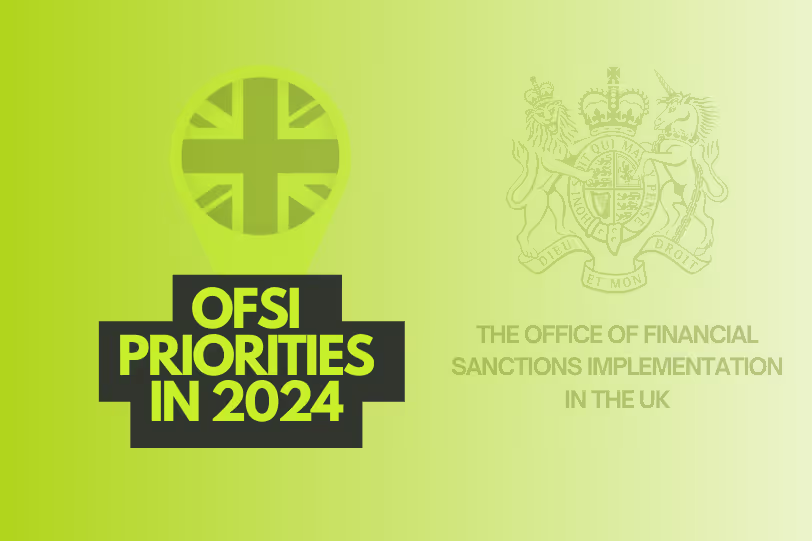
OFSI 2024 Priorities: What It Means for Sanctions Compliance
The United Kingdom's sanctions enforcer, OFSI, recently published its priorities for 2024. But why is this important? The answer is simple: The implications for businesses and organizations with UK operations are significant. This sanctions.io article cuts through the noise and reveals the essential takeaways compliance teams need to know.
OFSI's 2024 Blueprint: The Background
Before we dive into the critical points from OFSI's 2024 priorities, it's crucial to understand the context. And here is an important point:
OFSI - an acronym for the Office of Financial Sanctions Implementation - did not publish an official announcement stating what's at the top of their 2024 to-do list. So, where did this information come from?
Buried within OFSI's 36-page annual report, titled Annual Review 2022 to 2023: Strengthening our Sanctions, is a brief section looking ahead to 2024.
And guess what?
This segment offers a treasure trove of insights for the sanctions compliance community - including the industries OFSI intends to target in 2024. If you're curious whether your industry is among those targeted, continue reading.
1. Conflict in Ukraine Remains at the Forefront for OFSI
The UK sanctions regime targets countries such as Iran, Yemen, Venezuela, and many more. But it's important to remember that OFSI directs a significant allocation of its resources towards addressing the Russian invasion of Ukraine.
In the Looking Ahead to 2024 section, starting from page 31, OFSI makes a core objective crystal clear: Making a 'meaningful impact' on the ongoing conflict in Ukraine. In fact, Russia is mentioned as soon as the second paragraph of the entire document reflecting on 2022-2023.
As this is an area all compliance officers are well versed in (taking up many hours of their working days), we won't go into all the background details.
So, let's cut to the chase: What will this continued focus on Russian sanctions - and their effectiveness - have for sanctions compliance in 2024?
In a nutshell, OFSI is most concerned with sanctions evasion practices that allow Russia to continue to access resources and engage in international transactions, thereby undermining the intended impact of the sanctions imposed against the country (for example, through crypto).
Understanding this key OFSI objective should always be at the forefront of compliance teams' planning when deciding where to place resources in a risk-based approach to sanctions compliance in the UK.
2. Transition to Proactive Enforcement
In the past, if Company A broke the UK sanctions regime, OFSI would typically respond reactively to the violation, initiating enforcement actions after the breach.
In 2024, OFSI will increasingly embrace a proactive enforcement model. But what does that mean in plain English? Let's make an easy-to-understand comparison:
Speed cameras operate on a reactive enforcement basis. Joe Blogs speeds on his way home from work, and a few weeks later, he opens a letter informing him that he has a speeding ticket. On the other hand, a proactive approach to law enforcement could include police patrols in areas known for speeding - so drivers like Joe think twice before pressing their foot down.
Sanctions compliance is, of course, different from speeding violations. But you get the jist. OFSI is currently transforming to this proactive approach by utilizing the following:
- Improved information monitoring and data collection
- Increased intelligence capabilities
- Strict civil liability laws
What it means for compliance teams: OFSI's capabilities are growing fast. In 2024, it's imperative to remember that your company could appear in the UK sanctions enforcer's crosshairs for non-compliance, regardless of whether a sanctions breach occurred.
And remember, OFSI also stated that its enhanced powers given by The Economic Crime (Transparency and Enforcement) Act 2022 allow it to use strict liability in cases (put simply, it can legally disregard excuses defendants make).
3. Targeting High-Risk and Underreporting Sectors
We now know OFSI's 2024 enforcement strategy involves doubling down on a proactive enforcement approach. It's also mostly concerned with sanctions evasion practices that aid Russia.
But which sectors does it plan to target in the next 12 months? Before we answer this question, it's important to remember that all UK companies must comply with UK sanctions. Here is what OFSI says:

Returning to the focus of OFSI's 2024 plans, which high-risk and underreported sectors will it target? Here they are:
- Cryptoasset exchanges
- Custodian wallet providers
- The legal sector
- The property sector
- High-value dealers (e.g., jewelry, high-value cars)
Importantly, if your sector is not on the list, it's not a specific exclusion, and compliance remains a universal requirement for all UK companies.
And the bottom line is this: No matter what sector you operate within, 2024 isn't the time for sanctions compliance complacency within the UK jurisdiction.
Final Thoughts and How sanctions.io Can Help
One of the most effective ways to comply with the UK Sanctions List is to perform sanctions list checks on your customers and business partners. With technological advances, this is now cost-effective and easy to set up in a process called sanctions screening.
sanctions.io is a highly reliable and cost-effective solution for sanctions list checking. AI-powered and with an enterprise-grade API with 99.99% uptime are reasons why customers globally trust us with this critical process.
To learn more about how our sanctions, PEP, and criminal watchlist screening service can support your organization's compliance program:
We also encourage you to take advantage of our free 7-day trial (no credit card is required).



